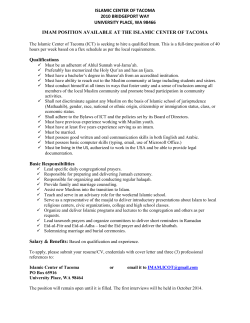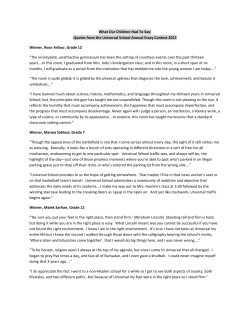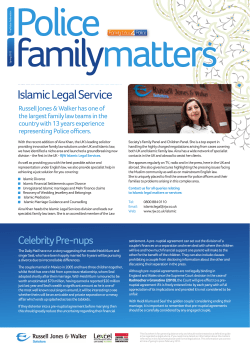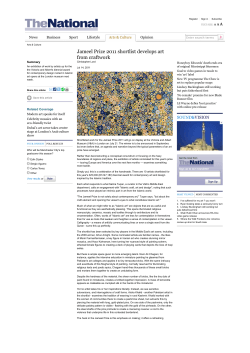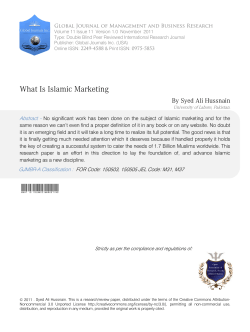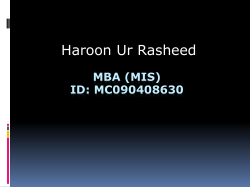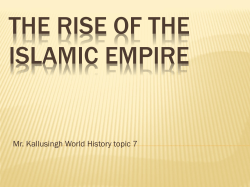
Islamic Finance OR By Dr. Aly Khorshid
November 5th, 2013 05/11/2013 Department of Social and Economic Science Islamic Finance Is It an Economic OR Religious System? By Dr. Aly Khorshid University of Reading, ICMA Centre, Henley Business School 1 • Is a system of the production trade and consumption of goods & services. • The economic agent can be individual, businesses, or Government • Transaction occur when two or more parties agree to the value or price of the transacted goods or service in an agreed currency • The currency or money is a medium of exchange (Money was created by the ancient Egyptian approximately 2000 years BC ) • Market base economy where goods and services are exchanged freely without interference according to the demand and supply by barter or exchange of money “Adam Smith defined economy as the products offered at a national price generated by the use of competition , while Governments should only regulate for abuse and control monopoly , Transparency and information is essential element for free market economy” • Economics activities are measured by GDP, consumers spending, Exchange rate, stock market, national debit, inflation rate, balance of trade, unemployment and interest rate 05/11/2013 Economic System 2 Different Economics system • Competition is on free market the price, production and consumption of goods based on demand and supply, the trade privately owned and managed for profit. • No regards to unemployment, social growth • Communism 05/11/2013 • Capitalism • All property and capitals are owned and managed by the state including economic activities, enterprise, labour, production and consumption. • Employment is the state to provide, wages are set by the state according to the national output • Islamic System • Market base economy, where goods and services are exchanged freely according to the demand and supply by barter or money with debit or credit value • Entrepreneurs are encouraged to create wealth throw employment and social activities • It is a balance between the two systems, it is emphasis both individual economic freedom and the need to serve the common good 3 • Religion is an organized collection of beliefs, faith, cultural system, ethics, morality and way of life • Almost all religion believe in God • The global sensor 2012 reports that the world population has reached 6.9 Billion of which 2.0 Billion 31% Christians, 1.7 Billion 23% Muslims, 13.8 Million 0.2% Jews and 59% are religious and 41 % non-religious. • Religion and business have been throughout the history interacted and affected one anther as well as influencing social-culture and politics, for example labour laws in the UK labour law as well as USA prohibited to discriminate against religion • To me Religion is a close relationship between me and God, I can ask him for guide, forgiveness 05/11/2013 Religion 4 • The practice of religion is between the person and his God in forms of pray or meditations, and in daily life such as marriage, funerary service, public service and charities • Economic systems are manmade system to regulate and reform trade: 05/11/2013 Can Economy and Religion mix Throw history economic systems have taken a form of trying and testing of what to produce? How to produce? Who gets what is produced? Efficacy, growth, liberty and equality are objectives to achieve in good economic systems In capitalist economic system production carried out to maximize profit, while in socialist systems labour and jobs is the goal 5 Islam • The word Islam means • Islam is a Holy religion that came to the world some 1443 years ago in the year 578. 05/11/2013 “submission” or “total surrender” to God, • There are 1.7 billion Muslims in the world (23% of total world population) with annual growth of 15% (in 2020 Muslim population expected 25% of the world population) , making it 2nd largest religion after Christianity. Only 20% of those live in Arab Countries. • God Revealed the Qur'an to people through his last messenger, Prophet Mohammed ”BPUH”. • The Qur'an is the holly book. • Mohammed's words and deeds are called Sunnah; both are the fundamental sources of Islamic law, known as Shariah. 6 • The five pillars of Islam: 1. Shahabad (profession of faith) 2. Salat (prayer) 3. Zakat (giving of alms) 4. Sawm Ramadan (fasting during the month of Ramadan) 5. Hajj (pilgrimage to Mecca for those who are able physically and financially) 05/11/2013 Islam 7 05/11/2013 • • • There are 1.7 billion Muslims in the world (23% of total world population) with annual growth of 15% in 2020 Muslim population expected 25% of the world population Only 20% of those live in Arab Countries. 8 • • • • • Justice, fairness and morality Are values which underpin both the entire Islamic way of life. Shariah gives guidance as to what is, and what is not, acceptable behaviour in all areas of a Muslim’s life Shari'ah is developed by Shari'ah scholars (Known as Schools of thoughts, Safaai, Hanafi, Hanbali, Malki, Sheaat ,etc. ) over 1000 years ago (over 400 years after Islam) The recent Scholars known as Shari'ah advisors or Shari’ah board has studied Fiqh Al-Muaamlat able to explain Shari'ah law for recent business dealings. The principal base of the Shari’ah Law is: the permissibility, the prohibition is exceptional 05/11/2013 9 Shari'ah law 9 • Islamic Banks Started in 1974 in Egypt with the first Islamic Bank “Nasser social bank” followed by Islamic development bank in 1975, now there are over 600 Islamic Banks globally • Islamic Banks started as interest free bank to help the small entrepreneurs to start business, the costs of managing the bank charged the stack holder as expanses • The framework of an Islamic financial system is based on elements of Shari'ah(Islamic Law) which prohibit Riba (Usury) and Gharar (Deception) and permit Risk sharing • The fundamental concept is that the money has no inherent value and should be used as a measure of worth • Shari’ah compliant investment are structured on the exchange of ownership in tangible assets or services with money acting as the payment mechanism to effect the transfer of ownership 05/11/2013 What is Islamic Finance? 10 • Recent Islamic scholars who from time to time re-examine the Shari'ah principals have structured new financial instruments • Those instruments must comply with principals of The of Shari'ah law • Ethics of the Shari’ah Law originate from: The Qur'an The Sunnah, Ijmaa - consensus among the jurists, Qiyyas – analogy Ijtihad - reasoning 05/11/2013 Shari’ah Law 11 Gharar (Deception, Speculation) Gambling (Future or goods you do not own) Prohibition In Islamic financial system Money Trading (money is payment mechanism) Short Sale 05/11/2013 Riba (Usury) Monopoly Unfair & Unjust Contracts Unlawful & unethical trade 12 Prohibitions • Prohibition of Unfairness & Unjust • Prohibition of Riba (usury) • Prohibition of Gharar (Deception & Speculation) 05/11/2013 In Islamic financial system • Prohibition of Gambling • Prohibition of Monopolies • Prohibition of Short Sales • Prohibition in money trading (Money is a medium not a commodity) • Prohibition of Dealing in Unlawful or Unethical Goods or Services 13 Products are not prohibited in Islam Products that are not monopolized by one party Shari'ah Compliant Products 05/11/2013 Products that exchangeable for money) Products are not traded under duress Products are traded in the open market Products that are free from Riba 14 • • • • • • Products that exchangeable for money Products are not prohibited in Islam Products are not traded under duress Products that are free from Riba Products are traded in the open market Products that are not monopolized by one party 05/11/2013 Shari'ah Compliant Products 15 • Because of the importance of money to all human being, regardless of his or her beliefs • Islam has addressed this issue in general terms, and gave societies the choice to develop their own financial systems, as long as the system is 05/11/2013 Islamic Finance Contracts Fair & Just To everyone 16 • Islamic Finance is fastest growing segments of the Global Financial services Industry • Global Islamic banking assets with commercial banks reached $1.6 trillion in 2013 (2011: $1.3 trillion), representing average annual growth of 17% • Islamic banking growth by 50% faster than overall banking sector in several core markets • Shari’ah compliant financial assets have been growing at rate 20-25% over the last 10 Years estimated at US$ 1.8 Trillion in 2012, That represent only 1.2 % of the global financial system • Still to small sum considering China Construction Bank hold US$ 2.6 Trillion in assets 05/11/2013 Global development of Islamic Finance 17 Mudarabah Muzara Musharakh Murabaha Ijara Contracts, etc. Home Financing Islamic finance contracts (Tools) Tawarruq 05/11/2013 Musaqaa Ijara Wa Iqtina Qard Hassan Salam Arbun Istisna'a Sukuk Bai be Thaman Ajil 18 Islamic finance contracts • • • • • • • • • • • • • • • Musharakh( Equity financing) Mudarabah(participation or Trust finance) Murabah(Cost-plus financing) bay’ bithaman ajil (BBA) Ijara (Operating lease) Ijara wa Iqtina(Finance lease) Istisna’a(Construction financing) Bai Salaam(Payment for future delivery) Arbun(Pre-purchase of right to acquire) Sukuk( Islamic Bonds issue) Tawarruq (opposite Murabaha) Home Financing (Islamic Mortgage) Qard Hassan (Interest free loan) Musaqaa (Aggregation) Muzara (Cultivation) 05/11/2013 (Tools or Instruments) 19 RISK’s FOR conventional BANKS OPERATIONAL FOREIGN EXCHANGE MARKET 05/11/2013 CREDIT RISK SOLVENCY & LIQUIDITY REPUTATION RISK RATE OF RETURN EQUITY INVESTMENT RISK 20 OPERATIONAL CREDIT risk shared MARKET FOREIGN EXCHANGE 05/11/2013 Risk’s For Islamic Banks SHARIAH COMPLIANCE RISK SOLVENCY & LIQUIDITY REPUTATION RISK RATE OF RETURN EQUITY INVESTMENT RISK 21 • Islamic Finance is an economical system based on Risk sharing (sharing profit & loss) • The Shari’ah explains the ethical concept of the money and capital use ( Money is a medium of transaction not a commodity) • The system prohibit RIBA, but also offers an alternative tools of avoiding Riba • The prohibition of GHARAR (Uncertainty) allowing all transaction to be transparent and free from deception • The system sets the social responsibility for the financial institution to take active part in the economic development to create jobs and generate wealth (such as Sukuk issuance to raise capital from small investors for new project development) not just profitmaking • The system sets the relationship between RISK and Profit 05/11/2013 What make Islamic Finance a Global system ? 22 • Prohibiting trade in Unethical products(such as Pork, pornography and alcohol) help the economy to grow ethically • There are numerous experienced Shari’ah Scholars who are to advise on the Shari’ah compliant activities • Over 60% of investors in Sukuk are non-Islamic corporate investors because its safer investment than Bonds • Although their their are different Schools of thoughts applied in different parts of the Glob, but all Schools agree on the same principals “different opinions benefit the people” “ for Example Shari’ah interpolation in Malaysia based on Shafie School and other parts of the world prefer anther School , but overall all Schools follow the same path” 05/11/2013 What make Islamic Finance a Global system 23 • One impact of the Global Financial Crises has been the rise of Islamic Finance because its resilience to such crises • Not one single Islamic Bank anywhere in world has needed to be bailed out by taxpayers or Government (Despite some difficulties in Dubai real estate) • Islamic Banks were not caught up with exposure to the “Toxic Assets” (Assets has no value) which hit the conventional banks • Products offerings and investment of Islamic Banks are relatively secure • The question heir to ask is: Would the Global crises have occurred if Islamic finance principals had been followed? 05/11/2013 Growth During the Crisis 24 • • • • Economy and Religion do not mix Islamic Finance is a global financial system Islamic Finance is an economic system based on Risk sharing Islamic Finance is not a religious system, its open for all people Muslim and non-Muslim to take part • Islamic finance is a system of making Money ethically • Islamic finance tools may have different terminology, the global economy apply similar tools, but the risk have not been shared fairly between the parties 05/11/2013 Conclusions 25 05/11/2013 26 THE END THANK YOU 26 What cause the credit crises 05/11/2013 Video: What is the Credit crisis? source: http://www.youtube.com/watch?v=l4KY9kQhdjU 27 Dr. Aly Khorshid IslamicFinanceScholar& ShariahConsultant VisitingFellowof IslamicStudies ICMACenser,ReadingUniversity,UK Dr.Khorshid has been involved with financial institutions for over 2 decades with comprehensive skills and knowledge in Islamic finance, Visiting Fellow ICMA centre Henley business school University of Reading, CEO of Islamic finance with Elite Horizon economic consultancy, his role includes Structuring, Endorsing and advising on Shariah complaint products with particular experience in Capital and stock market products, He is experienced in conduct comprehensive Due-diligences on financial institutions to identify potential investment opportunities. Dr. Khorshid has PhD on Islamic studies and economics from the University of Leeds (UK), studied Fiqh and Shariah at Al-Azhar University (Egypt), Master degree in managements (UK). His Publications includes,Islamic Insurance “A modern Approach to Islamic Banking”, and the Encyclopaedia of Islamic finance, Dictionary of Islamic Finance, Corporate Governance in Islamic Finance, “ A TENDER POWER” Novel instigates Islamic Finance for layman within fiction action love story, He also has many articles published on Islamic finance. Dr Khorshid is a trustee member of Academy UK International, member of the institute of management consultancy (UK), and former visiting lecturer in El-Azhar University “Egypt” and ‘SOAS’ University of London on Islamic finance. He is a regular speaker on Islamic finance issues at conferences and TV. Contacts: Email: a.khorshid@icmacentre.ac.uk alykhorshid@mac.com Mobil: +447944411777 28 Leading Consultants Development Advisory Services on Academic and Institutional Specialised on Islamic Banking and Finance Experienced in Management and leadership in commercial and academic environment Aly Khurshid, PhD Authors of more than 5 books and over 70 journal and conference papers Shari’ah Scholar, board member in several financial and academic institutions 29
© Copyright 2025
